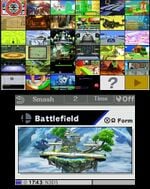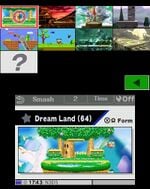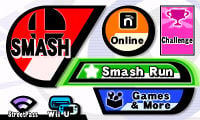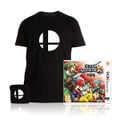Super Smash Bros. for Nintendo 3DS: Difference between revisions
No edit summary |
|||
| (27 intermediate revisions by 16 users not shown) | |||
| Line 24: | Line 24: | ||
The game is playable on the [[Nintendo 3DS]] in full stereoscopic 3D and is the first ''Smash'' title to be released on a handheld. | The game is playable on the [[Nintendo 3DS]] in full stereoscopic 3D and is the first ''Smash'' title to be released on a handheld. | ||
''Super Smash Bros. for Nintendo 3DS'' was released on September 13, 2014 in Japan, and was released in most other parts of the world on October 3, 2014. The game was released in stores one day earlier in Germany on October 2, one day later in Australia on October 4, in Hong Kong and Taiwan on July 24, 2015, and in South Korea on September 10, 2015. As of the closure of the Nintendo 3DS [[Nintendo eShop|eShop]] on March 27, 2023, it is no longer possible to officially digitally purchase this game or any of its post-launch | ''Super Smash Bros. for Nintendo 3DS'' was released on September 13, 2014 in Japan, and was released in most other parts of the world on October 3, 2014. The game was released in stores one day earlier in Germany on October 2, one day later in Australia on October 4, in Hong Kong and Taiwan on July 24, 2015, and in South Korea on September 10, 2015. As of the closure of the Nintendo 3DS [[Nintendo eShop|eShop]] on March 27, 2023, it is no longer possible to officially digitally purchase this game or any of its post-launch {{b|downloadable content|SSB4}}. On October 4, 2023, Nintendo announced that online support for the 3DS would be ending during April 2024. As announced on January 24, 2024, online support for the 3DS ended on April 8, 2024, making it impossible to officially play ''Super Smash Bros. for Nintendo 3DS'' online. | ||
==Fighters== | ==Fighters== | ||
| Line 31: | Line 31: | ||
{{SSB4 character table}} | {{SSB4 character table}} | ||
== | ==Stages== | ||
[[File:Stage Select SSB4-3DS Normal.jpg|thumb|right|150px|The stage select for ''Super Smash Bros. for Nintendo 3DS'', showing the normal stages.]] | |||
[[File:Stage Select SSB4-3DS Extra-Update.jpg|thumb|right|150px|The stage select for ''Super Smash Bros. for Nintendo 3DS'', showing the extra stages.]] | |||
The two versions of ''SSB4'' have separate sets of available stages; only 13 stages appear in both the Wii U and 3DS versions (Battlefield, Final Destination, Boxing Ring, Gaur Plain, Wily Castle and all DLC stages). The 3DS version's stages are based more heavily on handheld games. The 3DS version features a total of 42 stages (34 excluding [[DLC]]), 7 of which have to be unlocked. The 3DS version features 30 new stages and 12 [[past stage|familiar ones]]. The following stages are available in the 3DS version: | The two versions of ''SSB4'' have separate sets of available stages; only 13 stages appear in both the Wii U and 3DS versions (Battlefield, Final Destination, Boxing Ring, Gaur Plain, Wily Castle and all DLC stages). The 3DS version's stages are based more heavily on handheld games. The 3DS version features a total of 42 stages (34 excluding [[DLC]]), 7 of which have to be unlocked. The 3DS version features 30 new stages and 12 [[past stage|familiar ones]]. The following stages are available in the 3DS version: | ||
| Line 50: | Line 52: | ||
*[[Smash Run]] | *[[Smash Run]] | ||
== | ==Elements exclusive to the 3DS version== | ||
*[[Smash Run]], a mode similar to {{s|wikirby|City Trial}} from ''{{s|wikirby|Kirby Air Ride}}'', is exclusive to the 3DS version. Characters spend five minutes fighting enemies from various game series and collecting powerups, which are then active during a battle at the end. | *[[Smash Run]], a mode similar to {{s|wikirby|City Trial}} from ''{{s|wikirby|Kirby Air Ride}}'', is exclusive to the 3DS version. Characters spend five minutes fighting enemies from various game series and collecting powerups, which are then active during a battle at the end. | ||
*The 3DS version lacks the intro cutscene from the Wii U version, rather featuring an animated still akin to the beginning of ''[[Super Smash Bros. Brawl]]''{{'}}s intro instead. | |||
*Optional dark outlines around playable characters are present in the 3DS version in order to make characters stand out more on the small screen. The outlines can be set to thick or thin, or turned off completely. | *Optional dark outlines around playable characters are present in the 3DS version in order to make characters stand out more on the small screen. The outlines can be set to thick or thin, or turned off completely. | ||
*The 3DS version features different collectible [[trophies]] than the Wii U version, with a greater focus on | *The 3DS version features different collectible [[trophies]] than the Wii U version, with a greater focus on handheld games. | ||
*The 3DS version of [[Classic Mode]] is different, being more linear with three paths to choose from each battle. | |||
*The 3DS version has only two musical tracks per stage, similar to the [[alternate music]] in ''[[Super Smash Bros. Melee]]''. | *The 3DS version has only two musical tracks per stage, similar to the [[alternate music]] in ''[[Super Smash Bros. Melee]]''. | ||
*The 3DS version displays the [[damage meter]] on the bottom screen, as well as displaying certain other UI elements on it. | |||
*In the 3DS version, players can tap on a character's icon on the bottom screen to place a marker on that character on the top screen in order to more easily follow their movements. It follows characters even when they're invisible, with the exception of Greninja's [[Shadow Sneak]] and [[Substitute]]. | *In the 3DS version, players can tap on a character's icon on the bottom screen to place a marker on that character on the top screen in order to more easily follow their movements. It follows characters even when they're invisible, with the exception of Greninja's [[Shadow Sneak]] and [[Substitute]]. | ||
*The 3DS version features {{s|wikipedia|StreetPass}} functionality as part of the [[StreetSmash]] mode. | *The 3DS version features {{s|wikipedia|StreetPass}} functionality as part of the [[StreetSmash]] mode. | ||
| Line 65: | Line 70: | ||
==Reception== | ==Reception== | ||
Reviews of ''Super Smash Bros. for Nintendo 3DS'' have been mostly positive, with Famitsu giving the game an almost perfect score of 37/40. This version of the game alone managed to sell over 1 million copies during the first weekend after its launch in Japan. As of October 7th, 2014, the game has sold 2.8 million copies worldwide. As of | Reviews of ''Super Smash Bros. for Nintendo 3DS'' have been mostly positive, with Famitsu giving the game an almost perfect score of 37/40. This version of the game alone managed to sell over 1 million copies during the first weekend after its launch in Japan. As of October 7th, 2014, the game has sold 2.8 million copies worldwide. As of September 30, 2024, the game has sold 9.65 million copies, making it the better-selling of the two versions of ''[[Super Smash Bros. 4]]''.<ref>{{cite web|url=https://www.nintendo.co.jp/ir/en/finance/software/3ds.html|title=IR Information:Top Selling Title Sales Unit|publisher=Nintendo|accessdate=2024-12-20}}</ref> | ||
Despite this, the game has minimal tournament representation, as ''[[Super Smash Bros. for Wii U]]'' shares its gameplay and mechanics but is largely seen as the more accessible version for [[tournament play]] due to its multiple control schemes and more clearly visible graphics. In addition, the handheld nature of the 3DS version greatly increases the possibility of [[lag]] in local wireless play, since no two players can play on the same system, unlike the Wii U version. Nonetheless, the 3DS version remains popular for online play, for which it suffers from fewer drawbacks compared to the Wii U version than for local multiplayer. | Despite this, the game has minimal tournament representation, as ''[[Super Smash Bros. for Wii U]]'' shares its gameplay and mechanics but is largely seen as the more accessible version for [[tournament play]] due to its multiple control schemes and more clearly visible graphics. In addition, the handheld nature of the 3DS version greatly increases the possibility of [[lag]] in local wireless play, since no two players can play on the same system, unlike the Wii U version. Nonetheless, the 3DS version remains popular for online play, for which it suffers from fewer drawbacks compared to the Wii U version than for local multiplayer. | ||
| Line 71: | Line 76: | ||
==In competitive play== | ==In competitive play== | ||
{{main|Super Smash Bros. 4 in competitive play}} | {{main|Super Smash Bros. 4 in competitive play}} | ||
Despite being the first version to release and effectively being the same game on a competitive level, the 3DS version has arguably the smallest competitive scene of any game in the series. This is due to the community simply | Despite being the first version to release and effectively being the same game on a competitive level, the 3DS version has arguably the smallest competitive scene of any game in the series. This is due to the community simply preferring {{Forwiiu}} as an avenue to play ''Smash''. Because of this, very few major tournaments existed for the game and it tends to only be in side tournaments to this day. | ||
The community has constructed a set of [[tournament legal (SSB4)|standard tournament rules]] to regulate tournament play. While rulesets may vary between different tournaments, generally universal gameplay rules include all matches being played via [[time]]d [[stock]] (2-3 stocks and 6-8 minutes), and restrictions on legal [[stage]]s. These regulations are enacted to ensure that gameplay at the highest level remains fair and interesting. | The community has constructed a set of [[tournament legal (SSB4)|standard tournament rules]] to regulate tournament play. While rulesets may vary between different tournaments, generally universal gameplay rules include all matches being played via [[time]]d [[stock]] (2-3 stocks and 6-8 minutes), and restrictions on legal [[stage]]s. These regulations are enacted to ensure that gameplay at the highest level remains fair and interesting. | ||
Latest revision as of 07:08, December 24, 2024
| Super Smash Bros. for Nintendo 3DS | |
|---|---|
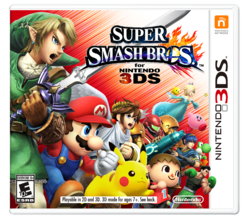 North American boxart. | |
| Developer(s) | Bandai Namco Sora Ltd. |
| Publisher(s) | Nintendo |
| Designer(s) | Masahiro Sakurai |
| Engine | Havok |
| Released | September 13, 2014 October 2, 2014 October 3, 2014 October 4, 2014 July 24, 2015 September 10, 2015 |
| Genre(s) | Fighting Platforming |
| Mode(s) | Single player, Multiplayer, Online multiplayer |
| Ratings | ESRB: E10+[1] PEGI: 12+ (provisional) |
| Media | 3DS card Digital download (9108 blocks |
Super Smash Bros. for Nintendo 3DS (大乱闘スマッシュブラザーズ for Nintendo 3DS, Great Fray Smash Brothers for Nintendo 3DS) is one of two games in the Super Smash Bros. series released as part of the Super Smash Bros. 4 pair, and the handheld counterpart to Super Smash Bros. for Wii U. Although most gameplay elements are shared between the two versions, there are several elements which distinguish the two.
The game is playable on the Nintendo 3DS in full stereoscopic 3D and is the first Smash title to be released on a handheld.
Super Smash Bros. for Nintendo 3DS was released on September 13, 2014 in Japan, and was released in most other parts of the world on October 3, 2014. The game was released in stores one day earlier in Germany on October 2, one day later in Australia on October 4, in Hong Kong and Taiwan on July 24, 2015, and in South Korea on September 10, 2015. As of the closure of the Nintendo 3DS eShop on March 27, 2023, it is no longer possible to officially digitally purchase this game or any of its post-launch downloadable content. On October 4, 2023, Nintendo announced that online support for the 3DS would be ending during April 2024. As announced on January 24, 2024, online support for the 3DS ended on April 8, 2024, making it impossible to officially play Super Smash Bros. for Nintendo 3DS online.
Fighters[edit]
The playable roster is the same between both versions of SSB4.
| Veterans (37) | |||||||||||||||
|---|---|---|---|---|---|---|---|---|---|---|---|---|---|---|---|
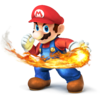 Mario |
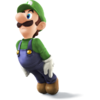 Luigi |
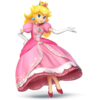 Peach |
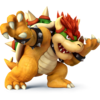 Bowser |
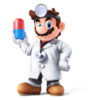 Dr. Mario |
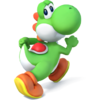 Yoshi |
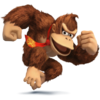 Donkey Kong |
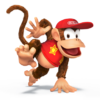 Diddy Kong | ||||||||
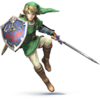 Link |
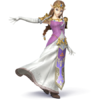 Zelda |
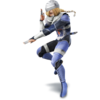 Sheik |
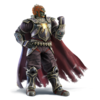 Ganondorf |
 Toon Link |
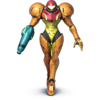 Samus |
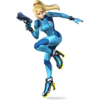 Zero Suit Samus |
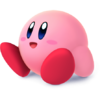 Kirby | ||||||||
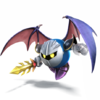 Meta Knight |
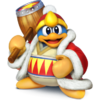 King Dedede |
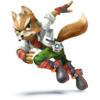 Fox |
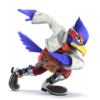 Falco |
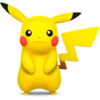 Pikachu |
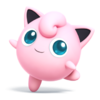 Jigglypuff |
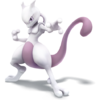 Mewtwo (DLC) |
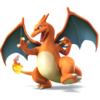 Charizard | ||||||||
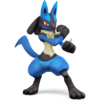 Lucario |
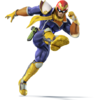 Captain Falcon |
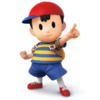 Ness |
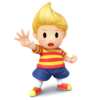 Lucas (DLC) |
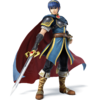 Marth |
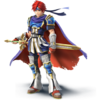 Roy (DLC) |
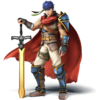 Ike |
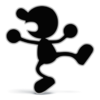 Mr. Game & Watch | ||||||||
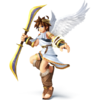 Pit |
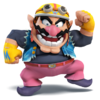 Wario |
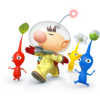 Olimar |
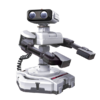 R.O.B. |
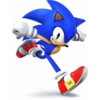 Sonic |
|||||||||||
| Newcomers (21) | |||||||||||||||
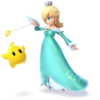 Rosalina & Luma |
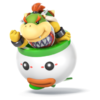 Bowser Jr. |
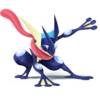 Greninja |
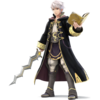 Robin |
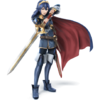 Lucina |
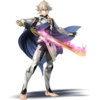 Corrin (DLC) |
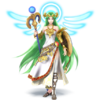 Palutena |
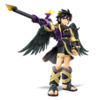 Dark Pit | ||||||||
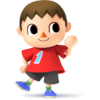 Villager |
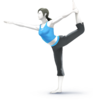 Wii Fit Trainer |
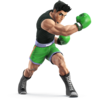 Little Mac |
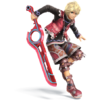 Shulk |
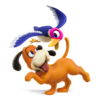 Duck Hunt |
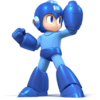 Mega Man |
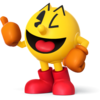 Pac-Man |
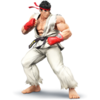 Ryu (DLC) | ||||||||
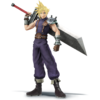 Cloud (DLC) |
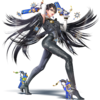 Bayonetta (DLC) |
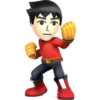 Mii Brawler |
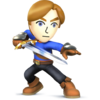 Mii Swordfighter |
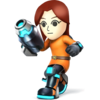 Mii Gunner |
|||||||||||
Bold denotes unlockable characters in both versions.
Bolded italics denote unlockable characters in the 3DS version only.
Stages[edit]
The two versions of SSB4 have separate sets of available stages; only 13 stages appear in both the Wii U and 3DS versions (Battlefield, Final Destination, Boxing Ring, Gaur Plain, Wily Castle and all DLC stages). The 3DS version's stages are based more heavily on handheld games. The 3DS version features a total of 42 stages (34 excluding DLC), 7 of which have to be unlocked. The 3DS version features 30 new stages and 12 familiar ones. The following stages are available in the 3DS version:
Bold denotes unlockable stages.
Single-player modes[edit]
Multiplayer modes[edit]
Elements exclusive to the 3DS version[edit]
- Smash Run, a mode similar to City Trial from Kirby Air Ride, is exclusive to the 3DS version. Characters spend five minutes fighting enemies from various game series and collecting powerups, which are then active during a battle at the end.
- The 3DS version lacks the intro cutscene from the Wii U version, rather featuring an animated still akin to the beginning of Super Smash Bros. Brawl's intro instead.
- Optional dark outlines around playable characters are present in the 3DS version in order to make characters stand out more on the small screen. The outlines can be set to thick or thin, or turned off completely.
- The 3DS version features different collectible trophies than the Wii U version, with a greater focus on handheld games.
- The 3DS version of Classic Mode is different, being more linear with three paths to choose from each battle.
- The 3DS version has only two musical tracks per stage, similar to the alternate music in Super Smash Bros. Melee.
- The 3DS version displays the damage meter on the bottom screen, as well as displaying certain other UI elements on it.
- In the 3DS version, players can tap on a character's icon on the bottom screen to place a marker on that character on the top screen in order to more easily follow their movements. It follows characters even when they're invisible, with the exception of Greninja's Shadow Sneak and Substitute.
- The 3DS version features StreetPass functionality as part of the StreetSmash mode.
- The 3DS version has a new sound test feature that lets players listen to music in the game while the 3DS is in Sleep Mode.
Demo[edit]
The demo is restricted to Vs. Mode only and allows only Mario, Link, Pikachu, Villager and Mega Man as playable characters, with Battlefield (normal form and Ω form) as the only available stage. Rules cannot be adjusted from two minute time matches. Both fighting against AI and local multiplayer are possible. The only mode available outside of regular battles is the Tips section, which provides gameplay tips. These tips also appear on loading screens.
On September 9th 2014, the demo was made available on the Japanese Nintendo eShop. On September 12th, 2014, download codes for the demo were sent out to selected members of Club Nintendo Europe and Platinum members of the United States Club Nintendo; on September 12th, 2014, download codes were sent out to selected members of Club Nintendo Australia and New Zealand; recipients of the download codes received four each, to promote the games' four-player multiplayer feature. The demo was made available on the eShop without a code on September 19th, 2014, but unlike the download code demo, it has a limit of 30 plays.
Reception[edit]
Reviews of Super Smash Bros. for Nintendo 3DS have been mostly positive, with Famitsu giving the game an almost perfect score of 37/40. This version of the game alone managed to sell over 1 million copies during the first weekend after its launch in Japan. As of October 7th, 2014, the game has sold 2.8 million copies worldwide. As of September 30, 2024, the game has sold 9.65 million copies, making it the better-selling of the two versions of Super Smash Bros. 4.[3]
Despite this, the game has minimal tournament representation, as Super Smash Bros. for Wii U shares its gameplay and mechanics but is largely seen as the more accessible version for tournament play due to its multiple control schemes and more clearly visible graphics. In addition, the handheld nature of the 3DS version greatly increases the possibility of lag in local wireless play, since no two players can play on the same system, unlike the Wii U version. Nonetheless, the 3DS version remains popular for online play, for which it suffers from fewer drawbacks compared to the Wii U version than for local multiplayer.
In competitive play[edit]
Despite being the first version to release and effectively being the same game on a competitive level, the 3DS version has arguably the smallest competitive scene of any game in the series. This is due to the community simply preferring Super Smash Bros. for Wii U as an avenue to play Smash. Because of this, very few major tournaments existed for the game and it tends to only be in side tournaments to this day.
The community has constructed a set of standard tournament rules to regulate tournament play. While rulesets may vary between different tournaments, generally universal gameplay rules include all matches being played via timed stock (2-3 stocks and 6-8 minutes), and restrictions on legal stages. These regulations are enacted to ensure that gameplay at the highest level remains fair and interesting.
Staff[edit]
Gallery[edit]
A flourished excerpt from the main menu theme of Smash 4 that plays when either the game or the Smash Controller app is highlighted on the 3DS HOME Menu. It can also be heard on the Wii U upon starting the game from the HOME Menu or Quick Menu.
3DS version title screen.
A Smash 3DS bundle available on the Nintendo UK Online Store, featuring a shirt and sweatband.
Trivia[edit]
- Super Smash Bros. for Nintendo 3DS has the second most series represented by stages but with no characters, at five, with Ultimate having the most, with nine series.
- Super Smash Bros. for Nintendo 3DS is the only game in the series where neither the Star Fox 64 main theme or the Pokémon main theme appear.
- Super Smash Bros. for Nintendo 3DS is the first game in the series to lack an appearance of Ridley, and a new stage from the Donkey Kong, Metroid, Yoshi, and Star Fox universes.
- Super Smash Bros. for Nintendo 3DS is the first and currently only game to not have an opening movie when booting up the game.
- Because of the amount of RAM that Super Smash Bros. for Nintendo 3DS uses, it cannot run alongside other programs on the 3DS that use the internet. However, this does not occur on the 3DS' enhanced model, the New Nintendo 3DS, due to the latter system having larger RAM.
- Super Smash Bros. for Nintendo 3DS is the only appearance on the 3DS for Lucas, Duck Hunt, Wii Fit Trainer, and Bayonetta.
- This game marks also the first but not the last appearance of Zero Suit Samus, Meta Knight, Ness, Mr. Game & Watch, Olimar and Shulk.
- In a similar vein to Brawl's introduction, when starting up Super Smash Bros. for Nintendo 3DS, the roster of characters is shown, appending any unlocked or downloaded characters to the lineup as well.
- Each character actually has two models: a detailed one for trophies, the results screen and when the game is paused, and a model with lower polygon count for when the game is in motion. This is more noticeable in Training Mode when the player zooms in on the character and sets the speed to half or quarter speed when L is held.
- Super Smash Bros. for Nintendo 3DS is the only game in the series to not support the GameCube controller in any official way.
- Super Smash Bros. for Nintendo 3DS is the first (and currently only) game in the series to have a downloadable demo prior to release.
- Rainbow Road and Pac-Maze are the only two new stages from this game, excluding Battlefield and Final Destination, to not be featured in Ultimate.
See also[edit]
References[edit]
- ^ Page on Nintendo of America's official website
- ^ http://www.neogaf.com/forum/showthread.php?t=877313
- ^ IR Information:Top Selling Title Sales Unit. Nintendo. Retrieved on 2024-12-20.
| Super Smash Bros. series | |
|---|---|
| Super Smash Bros. · Super Smash Bros. Melee · Super Smash Bros. Brawl · Super Smash Bros. 4 (for Nintendo 3DS · for Wii U) · Super Smash Bros. Ultimate |
